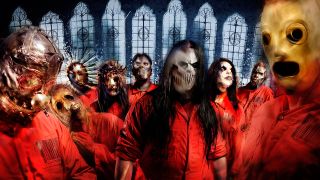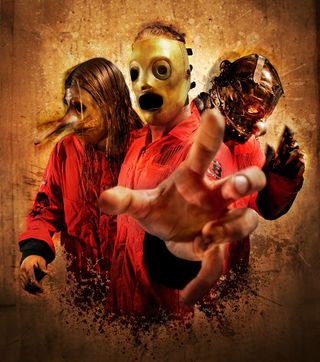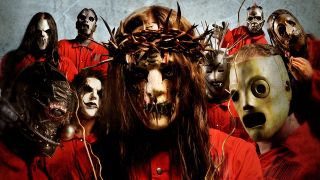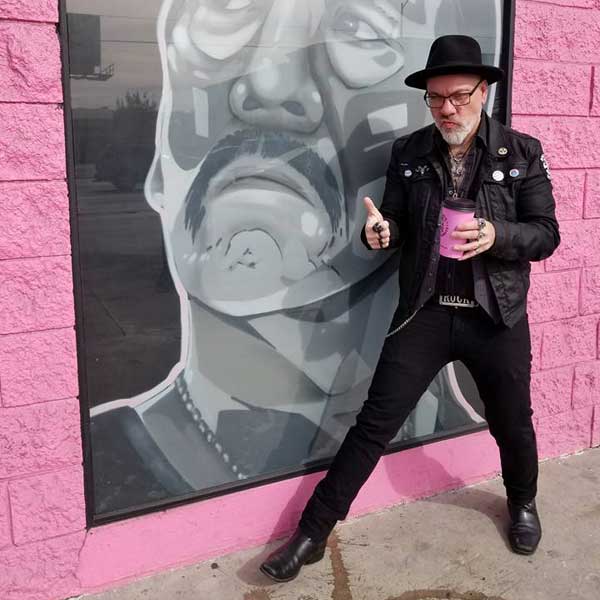They are the village people of the damned, a psychedelic terror circus populated by depressed clowns, obsessive-compulsives, misanthropes, cyborgs, droogs, ghouls and goblins. Their sound is a barrage of noise and confusion, a bundle of hiss and the dynamiting of mountains. They look like escaped mental patients on Halloween, and their demeanour vacillates between grandiose and openly hostile. They are Slipknot, and they are legion.
Since 1995, these nine creatures of latex and bone from the fertile plains of Des Moines, Iowa, have lorded over their dysfunctional kingdom of maggots and problem children with shaky hands that have often succumbed to their own wretched excesses. As the band went from strength to strength, from the runaway freight train of their 1999 self-titled debut album to the embittered, embattled success of 2001’s Iowa and their surprisingly tuneful comeback, 2004’s Vol. 3: (The Subliminal Verses), Slipknot scaled unheard-of heights for an extreme metal band, snapping up Gold and Platinum albums, winning Grammy awards, infiltrating the mainstream like sinister double agents.
- The best deals on Slipknot shirts and merch
- Why Slipknot thrive on dysfunction
- How the Slipknot phenomenon was born
None of it came easy, and lurking behind the mask was a band at war with itself; a band riddled with drug, alcohol, and ego problems. In 2005, the levy finally broke, and Slipknot took a much-needed break, the various members healing, mending fences, and exploring other creative avenues. Singer Corey Taylor and guitarist Jim Root returned to Stone Sour, drummer Joey Jordison played with a myriad of bands, from Korn to Metallica, and drummer and visual artist Shawn ‘Clown’ Crahan produced the revealing ’Knot-doc Voliminal: Inside The Nine, among other projects.
But they could not avoid their fates forever, and so Slipknot return with a roaring new album, All Hope Is Gone, which pits a burgeoning retro-thrash metal obsession and their recent flirtations with melody against their original vision of pure, bloodlusting aggression and brutality. And with this latest dispatch from the abyss comes the expected media saturation, as well as an endless arc of tours and festivals and television performances. It is during the brief calm before the storm that Metal Hammer catches up with Slipknot, rehearsing their new set at Wells Fargo Arena in downtown Des Moines.

Is it normal to be practicing in an arena?
Shawn ‘Clown’ Crahan (percussion): “It’s not normal, but it’s not surprising at the level we’re at. It was my idea to do this, to practise in the small room and get it tight, and then to come out here and get the feeling of the arena again. Otherwise, you’re practising in people’s houses, and we’re nine brothers. Imagine nine brothers with nine families and everybody running with different crews, and all having different morals and standards and spiritualities. Imagine that fuckin’ insanity. So this makes sense.”
Des Moines had a series of floods recently. Did they affect the band at all?
Corey Taylor (vocals): “Not really. I spent a couple days running around saving my friends. Everybody I knew with the exception of just a couple of people lived on the flood plain, so I was just going out and helping people get the fuck out of there. I had a house full of people for a week.”
For years now, there have been allegations that you guys all hate each other. Is the band still dysfunctional?
Joey Jordison (drums): “Yeah, we are dysfunctional. But I mean, we all grew up together. Me and Mick [Thomson, guitar] are like, best friends, and I used to detest that guy. We fuckin’ hated each other, man. And Shawn, me and him are probably the closest brothers in the whole band, but we probably get along the least because we love each other so much, and we control a lot of what goes on in Slipknot. We’re constantly butting heads.
"I remember right before Ozzfest, you could just cut the tension between me and him with a knife, it was so thick, and one day I left practice all pissed off, and I was saying, ‘Fuck off, I think I’m quitting.’ There we were, we just got the ticket, we were on our way to making it. That’s how fuckin’ stressed out we were. And literally – he’s a lot bigger than I am – Shawn flipped his kit over, came over to my drumset, ripped my stuff down and held me by the fuckin’ throat, and I grabbed his throat and went to punch him, and then the whole band dogpiled us. We’ve had lots of fights like that, real fistfights. But even though we still get into fights, we don’t let them last that long anymore. The band is just so intense. I mean, we’ve got nine extreme personalities here.”
On a scale of one to 10, how nuts is your DJ, Sid? He just told me that he's a cyborg and I think he really means it.
Joey: “One to 10? Like, 13. Yeah, he’s crazy. You take 72 hits of acid in one weekend, it’s gonna fry your brain up a little bit.”
How do you guys balance all the side-projects with Slipknot?
Joey: “It’s fuckin’ simple. Slipknot comes first.”
So it didn't take any convincing to get everybody back to do a new album?
Joey: “Well, it usually happens when the other bands sorta run their course. Certain people in the band decide not to do anything, they just chill out until the next Slipknot record. Me, I do a lot of work with other bands, but Slipknot’s my priority, and I’m glad to be back playing with these guys. The first day when we started rehearsal, usually people are laidback, but it was like headbang city man, and we were like, ‘Let’s just get out metal necks, let’s get that shit out of the way.’ It feels great, man. I’m happy.”
Corey: “I was completely stoked to do it. I’d actually started thinking of it and preparing for it on the Stone Sour tour. I just started filling notebooks with ideas. It got to the point where I had two notebooks full of stuff, and I was just ready to go. So as soon as the music was written and the demos started floating around, I was just like, ‘OK, this fits here and this fits here.’ I wasn’t rushing around to write lyrics, which a lot of guys do.
“I was very prepared and not only was I saying everything I wanted to say, but I was doing it in a way I was ecstatic about. I knew I wanted to go heavier, and I knew at the same time that I wanted to balance that with this melodic side that we had really tapped into. And the proof is there. I think this album is the best thing we’ve ever done, to be honest. I think it really shows the growth of the band and the maturity. But it’s still chaotic and heavy, but it’s still got those moments where you just go, ‘Holy fucking shit!’ Not only is it good, but the more you listen to it, the more you find. There’s a lot of layers, and that’s something that gets lost on a lot of people. There’s just so much thought and so much meaning behind everything we do. It’s not just shock for shock’s sake.”
What's the theme for All Hope Is Gone? Hopelessness by any chance?
Corey: “It’s not a blatantly political or social album, and it’s not a blatantly angry album. I think the overwhelming theme, for me, is that none of us are the same, but none of us are different. We may change as people, but if we use the same energy to try and solve different problems, nothing is going to get accomplished. And that’s something that I think is lost on a lot of people.”

What was it like having Dave Fortman as a producer for this one?
Joey: “Dave was great. It’s not like when we were recording with Rick Rubin – he was like an oracle. He would make these little tweaks from his house. He’d sit in this little library in his house, he’d sit there cross-legged with these prayer beads and he’d get a vibe, and he’d tell the engineer what to do. That was a weird way to record. But Dave, he was there every hour, every day. When we write songs, we tend to write really long like, [Metallica’s] …And Justice For All-type songs, nine or 10 minutes long. So we’d record the song like that, and Dave would help us chop it down. The thing with Dave is, that guy knows his tones. I finally got the best drum sound in my life. The guitar sound, the bass, the percussion… finally, we’ve got the Slipknot sound I’ve been wanting to hear my whole life.”
You've got new masks and new outfits. Do you feel constrained at all by them?
Corey: “No. We don’t only have these, but we have actual outfits that we put together ourselves. They’re still cohesive, but they’re a little more individualistic. We had started doing that on the last album. It’s part of our evolution. If you’re not evolving, you’re dying. No matter what the fucking fans on the websites say, nobody wants to see the same fucking shit over and over again. This time around, we felt it was very important that we are represented as individuals and not just as a band, as pieces of a puzzle. The new mask and outfits range from outrageous to very subtle. It’s a reflection of who we are. But we also kept the boiler suits, because we like to appear as a unit.”
You guys got saddled with the 'nu metal' tag early on. Obviously at this point you've overcome it...
Corey: “There were a couple of bands that were good and that had a really good attitude. Snot comes to mind. That was an amazing band; I loved Snot. Hed PE – their first couple of albums were amazing, because they had so much attitude, and it was so different. But then you had bands like Limp Bizkit and all that crap, where it just got so watered down; the P.O.D.s, fuckin’ bands like that, where there was zero talent going on.
“It was frustrating being caught up in that, but at the same time, people don’t want to think outside of what they already know. They want their opinions force-fed to them. So if a magazine comes out and says we’re nu metal, than that’s what they’re going to say. It took us a long time to change people’s minds. We’re just a metal band. The people that wanted to write us off as a nu metal band weren’t our fans, they just didn’t know what to call us. We just got stronger and stronger and more willing to experiment and so they just didn’t know what we were. In that respect, we sort of created our own genre, and there’s a lot of bands that kinda take cues from us now. It’s kinda weird.”
Slipknot broke the ceiling for extreme metal bands making it in the mainstream. Did it shock you when it was happening?
Corey: “At the time we didn’t even think about it, we were just real busy working. We were literally on the road for 18 months and saw home for maybe three weeks in that entire time. We were gone forever. But we knew that was going to happen, so we just put our heads down and did what we had to do, because we just refused to lose. So once we got that done we had time to take a breath. We were getting ready to start on the Iowa tour, and we just turned around and were like, ‘Whoa! Look what we did. We’re fucking huge!’ We were playing this place that’s not even there anymore, it was called the Bronco Bowl in Dallas. It was set up like a mini-arena and it was just fucking gagged, fucking jammed with people.
“I remember walking out on stage and thinking, ‘Are we opening up for somebody? Where did all these fucking people come from?’ They knew every word, they knew everything. I remember coming off stage and just having this amazing smile on my face. I was like, ‘Something’s different. We’re not an opening band anymore.’ And I don’t think we’d ever be again, unless we were opening for somebody like Metallica. It was insane, it was probably the best feeling I’ve ever felt in my life.”
Joey: “It didn’t happen overnight, because we had to work so hard for it but… it happened overnight. We went on Ozzfest, and three weeks into it we’d sold 150,000 records. Every time we played, everybody – every fucking band, Black Sabbath included – was out there watching us. And we’re out for blood, we fucking hate everybody, just ‘Fuck you!’ That’s always been the Slipknot mentality. We love a lot of other bands, we love a lot of different music, but when it comes to us playing, we just don’t care. It’s your ass. People think it’s arrogant, and it is. We believe in our craft. We believe in Slipknot.”
Is it tough accepting the fact that you have to wear a mask for the next year?
Joey: “No, not at all. I’m ecstatic to be back and playing with the guys again. It’s home, man. We take breaks because Slipknot is not just music, it’s a force, it’s a lifestyle. It’s also like being in jail. You’re constricted. You have to be on your game every night to be in this band. The stuff is not easy to play anyway, but we’ve got the whole stage performance, playing in masks, it’s what every band goes through, but with nine guys it’s very intense. I mean, look at this – all nine guys are still together. All nine original guys are still here. What other band can say that?”
So, has anybody ever tried to get out?
Joey: “No, no one ever has. That’s why at the end of a 15-month tour cycle, we’re just like, let’s take a break, work on some other projects, just relieve a little stress. But when we come back to Slipknot, it’s on, man. There’s no fucking around.”
Is Slipknot meant to last forever, or do you have to write the end of the story?
Clown: “You nailed it, man. I am in more pain than anyone could possibly ever know, because I have to find a way to finish this.”
Joey: “I don’t think it’s our last record at all, but there’s something seriously going on with this record, that’s for sure. It’s like Friday The 13th Part IV: The Final Chapter. It’s a climax.”
Is Slipknot like Kiss, where you could lose a member and just find somebody else to wear his mask?
Clown: “No. If I left this band, we’d be done. If Joey Jordison left this band, we’d be done. All of us, if any of the guys in this band leave… See, it’s been out of our hands for a long time, since 1998. The world is just too dumb, too anti-art, to realise how important this is, to actually accept the truth that yes, if I left the band it’d be over. There could never be a drummer to replace me, man. We are The Nine. There is no one else.”
Nine long, tense, and occasionally violent hours later, Slipknot begin to slink out into the inky-black, dead-still Des Moines night. It’s a mere week until they begin headlining the Mayhem tour in the States, and that’s just the beginning. Once this album hits the streets, it is unlikely that any of them will see their homes again for at least a year, and probably longer. Although the band harbours the expected anxieties about their long-awaited return to the metal arena, the sprawling, expansive All Hope Is Gone will probably be their biggest album ever. At this point, the eldest members of the band are now approaching 40, while their fanbase still hovers around 18, and that’s the same sort of 18 Alice Cooper once sang about: the confused, angry, half-a-boy, half-a-man kind.
If any of The Nine hoped to escape their fates as the ringleaders of the tormented, those hopes are now dashed.
“Man, it’s fucking embarrassing,” Clown admitted earlier, when we asked him how it felt to be a dad playing teen-rage anthems.
“I’m just glad I’m not alone in this, with this fucking-metal-fucking-arena-rock-fucking-stage-pass-interview-fucking-photoshoot shit. I don’t care about it. Yes, my art has grown into a way of life, yes, there’s a lot of people that live their lives by it, but I’ve always told people, I don’t want to be on the cover of Metal Hammer, I want to be on the cover of National Geographic. I’ve always said that. I’m gonna be on the cover of Metal Hammer anyway, because that’s just what I fucking do. But I want to take you all on another journey, a fucking life journey, a painful journey. There’s a reason why Slipknot gets the people we get: because they’re lost. They’re lost, and they find their way to us. It’s like a cult, man,” he says, staring a hole right through us.
“A cult of fucking pain.”
There are those who say hope springs eternal. They have obviously never spent a day with Slipknot.

In October 2013, Joey Jordison stopped by the Metal Hammer Magazine Show to talk about his side-project, Scar The Martyr, life in Slipknot after Paul Gray and what to expect from the Des Moines Nine’s next album. Two months later he had left the band.


